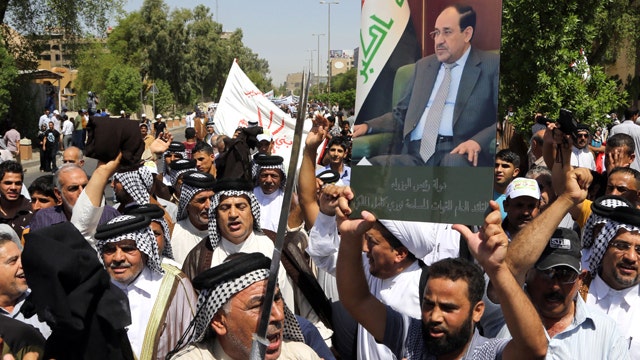Iraqi Shiite politicians dump incumbent PM Nouri al-Maliki
Jennifer Griffin reports from the Pentagon
Iraq's embattled prime minister is on the ropes, as rival Baghdad leaders moved to replace him and the U.S. nudged him to step aside and let someone else deal with the Sunni insurgency engulfing the nation.
Iraq's new president snubbed incumbent Prime Minister Nouri al-Maliki by nominating the deputy parliament speaker to form a new government Monday, in a move aimed at unifying the country against the growing threat of radical Sunni militants in the north.
Members of the Iraqi National group nominated Iraq’s deputy prime minister, Haider al-Ibadi, as its candidate, alliance head Ibrahim al-Jaafari said in a statement. Iraqi president Fouad Massoum then charged al-Ibadi with forming a new government in the next 30 days.
Massoum said on television Monday that he hoped al-Ibadi would succeed in forming a government that would "protect the Iraqi people."
The president's choice is a public rejection of al-Maliki, ho in an angry midnight speech all but demanded he be re-nominated for a third term. Al-Maliki's Shiite-dominated bloc won the most parliament seats in April elections and the prime minister sees himself as the rightful candidate.
Critics say the Shiite al-Maliki contributed to the crisis by monopolizing power and pursuing a sectarian agenda that alienated the country's Sunni and Kurdish minorities.
Secretary of State John Kerry told reporters Monday that forming a new government is critical to sustaining Iraq's stability.
"Our hope is that Mr. Maliki will not stir those waters. One thing all Iraqis need to know, that there will be little international support of any kind whatsoever for anything that deviates from the legitimate constitutional process that is in place and being worked on now," Kerry said while traveling in Australia.
"They need to finish that and give a new government an opportunity to be voted on and moved forward," Kerry added.
Vice President Joseph Biden spoke to al-Abadi by phone Monday to congratulate him on his nomination, according to a statement from Biden’s office. The Vice President relayed President Obama's congratulations and restated his commitment to fully support a new and inclusive Iraqi government, particularly in its fight against the Islamic State of Iraq and the Levant {ISIL.}
“The Prime Minister-designate expressed his intent to move expeditiously to form a broad-based, inclusive government capable of countering the threat of the {ISIL} and building a better future for Iraqis from all communities,” a statement from the Vice President’s office said.
Meanwhile, al-Maliki has deployed his elite security forces in the streets of Baghdad, partially closed two main streets -- popular spots for pro and anti-government rallies -- as hundreds of his supporters took to the streets.
"We are with you, al-Maliki," they shouted, waving posters of the incumbent premier, singing and dancing.
Iraq's government forces battled Sunni militants in the country's north and west with the help of American airstrikes Monday. U.S. warplanes carried out new strikes hitting a militant convoy moving to attack Kurdish forces defending the autonomous zone's capital, Irbil. American strikes in recent days helped bring one of the Kurds first victories after weeks of retreat as peshmerga fighters over the weekend recaptured two towns near Irbil.
Senior U.S. officials said the Obama administration has begun directly providing weapons to the Kurdish peshmerga forces who have started to make gains against the al Qaeda breakaway group.
Defense Department spokesman Lieutenant General William C. Mayville Jr. discussed U.S. air strikes and humanitarian airdrop missions to provide aid to Iraqi refugees during a press conference at the Pentagon Monday.
“We assess that U.S. airstrikes in northern Iraq have slowed ISIL's operational tempo and temporarily disrupted their advances towards the province of Irbil. However, the strikes are unlikely to affect ISIL's overall capabilities or its operations in other areas of Iraq and Syria,” Mayville told reporters.
At around the same time as al-Maliki's speech Sunday evening, the Wall Street Journal reported that security forces had deployed in unusually large numbers across Baghdad. The soldiers were particularly prominent in the so-called Green Zone, which includes the prime minister's home as well as the parliament building, crucial government offices and many embassies.
Al-Maliki, speaking on Iraqi TV for the first time since U.S. forces began launching airstrikes and humanitarian airdrops in Iraq last week, said the security situation will only worsen as a result of Massoum's actions.
"This attitude represents a coup on the constitution and the political process in a country that is governed by a democratic and federal system," al-Maliki said Sunday. "The deliberate violation of the constitution by the president will have grave consequences on the unity, the sovereignty, and the independence of Iraq and the entry of the political process into a dark tunnel.
The political infighting could hamper efforts to stem advances by the Islamic State, the militant group formerly known as ISIS, who have seized a large swath of northern and western Iraq in recent weeks.
The Associated Press contributed to this report.








































